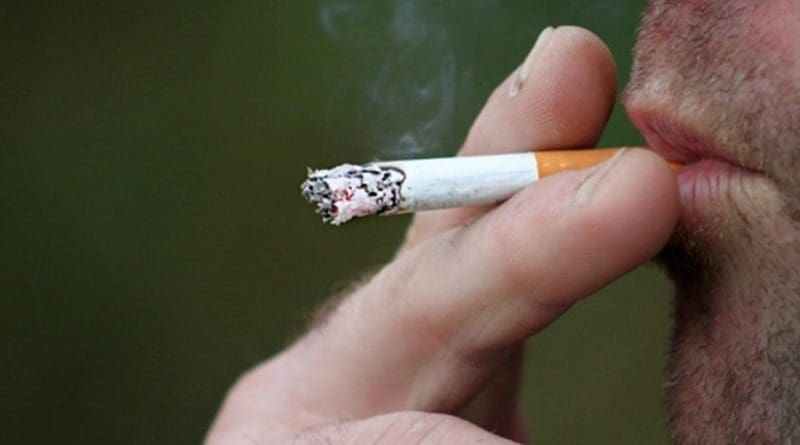Can Europe Successfully Rein In Big Tobacco? – Analysis
By Tomas Liutkus*
n what looks set to become the ‘dieselgate’ of the tobacco industry, a French anti-smoking organization has filed a lawsuit against four major tobacco brands for knowingly selling cigarettes with tar and nicotine levels that were between 2 and 10 times higher than what was indicated on the packs. Because the firms had manipulated the testing process, smokers who thought they were smoking a pack a day were in fact lighting up the equivalent of up to 10, significantly raising their risk for lung cancer and other diseases.
According to the National Committee Against Smoking (CNCT), cigarettes sold by the four companies have small holes in the filter that ventilate smoke inhaled under test conditions. But when smoked by a person, the holes compress due to pressure from the lips and fingers, causing the smoker to inhale higher levels of tar and nicotine. According to the lawsuit, the irregularity “tricks smokers because they are unaware of the degree of risk they are taking.”
It was only the most recent example of what appears to be a deeply entrenched propensity for malfeasance in the tobacco industry. And unfortunately, regulatory authorities across Europe still appear unprepared to just say no to big tobacco.
Earlier this month, for instance, Public Health England published a report which shines a positive light on “tobacco heating products” and indicates that electronic cigarettes pose minimal health risks. Unsurprisingly, the UK report has been welcomed by big tobacco, with British American Tobacco praising the clear-sightedness of Public Health England.
Meanwhile, on an EU-wide level, lawmakers are cooperating too closely for comfort with tobacco industry executives in their efforts to craft new cigarette tracking rules for the bloc.
The new rules are part of a campaign to clamp down on tobacco smuggling, a problem that is particularly insidious in Europe and is often attributed to the tobacco industry’s own efforts to stiff the taxman. According to the WHO, the illicit cigarette market makes up between 6-10% of the total market, and Europe ranks first worldwide in terms of the number of seized cigarettes. According to studies, tobacco smuggling is also estimated to cost national and EU budgets more than €10 billion each year in lost public revenue and is a significant source of cash for organized crime. Not surprisingly, cheap availability of illegally traded cigarettes is also a major cause of persistently high smoking rates in the bloc.
To help curtail cigarette smuggling and set best practices in the fight against the tobacco epidemic, the WHO established the Framework Convention on Tobacco Control (FCTC) in 2005. The first protocol to the FCTC, the Protocol to Eliminate Illicit Trade in Tobacco Products, was adopted in 2012 and later ratified by the EU. Among other criteria, the Protocol requires all cigarette packs to be marked with unique identifiers to ensure they can be tracked and traced, thereby making smuggling more difficult.
Unsurprisingly, the tobacco industry has come up with its own candidates to meet track and trace requirements, notably Codentify, a system developed by PMI. From 2005 through 2016, PMI used Codentify as part of an anti-smuggling agreement with the EU. But the agreement was subject to withering criticism from the WHO and other stakeholders for going against the Protocol, which requires the EU and other parties to exclude the tobacco industry from participating in anti-smuggling efforts.
The EU-PMI agreement expired in 2016 and any hopes of reviving it collapsed after the European Parliament, at loggerheads with the Commission, overwhelmingly voted against a new deal and decided to ratify the WHO’s Protocol instead. Codentify has since been sold to the French firm Impala and was rebranded as Inexto – which critics say is nothing but a front company for PMI since its leadership is made out of former PMI executives. Nonetheless, due to lack of stringency in the EU’s draft track and trace proposal, there is still a chance that Inexto may play a role in any new track and trace system, sidelining efforts to set up a system that is completely independent of the tobacco industry.
This could end up by seriously derailing the EU’s efforts to curb tobacco smuggling, given the industry’s history of active involvement in covertly propping up the black market for cigarettes. In 2004, PMI paid $1.25 billion to the EU to settle claims that it was complicit in tobacco smuggling. As part of the settlement, PMI agreed to issue an annual report about tobacco smuggling in the EU, a report that independent researchers found “served the interests of PMI over those of the EU and its member states.”
Given the industry’s sordid history of efforts to prop up the illicit tobacco trade, it’s little surprise that critics are still dissatisfied with the current version of the EU’s track and trace proposal.
Now, the CNCT’s lawsuit against four major tobacco firms gives all the more reason to take a harder line against the industry. After all, if big tobacco can’t even be honest with authorities about the real levels of chemicals in their own products, what makes lawmakers think that they can play a viable role in any effort to quell the illegal cigarette trade – one that directly benefits the industry?
Later this month, the European Parliament will have a new chance to show they’re ready to get tough on tobacco, when they vote on the pending proposal for an EU-wide track and trace system. French MEP Younous Omarjee has already filed a motion against the system due to its incompatibility with the letter of the WHO. Perhaps a ‘dieselgate’ for the tobacco industry might be just the catalyst they need to finally say no to PMI and its co-conspirators.
This article was published by Modern Diplomacy.

